The Japanese ruling coalition’s losses in Sunday’s upper house elections would affect Taiwan-Japan relations, as well as Japan’s regional security position, an academic said yesterday.
The Liberal Democratic Party (LDP) and its coalition partner Komeito failed to win enough seats to dominate the Japanese House of Councilors following its loss of a majority in the Japanese House of Representatives, making the ruling government a minority in both houses for the first time in 70 years.
Institute for National Policy Research president Tien Hung-mao (田弘茂) told a forum in Taipei that the election would have implications for US-Japan-South Korea relations and Taiwan-Japan ties, as the houses have the authority to change the composition of the Japanese Cabinet.
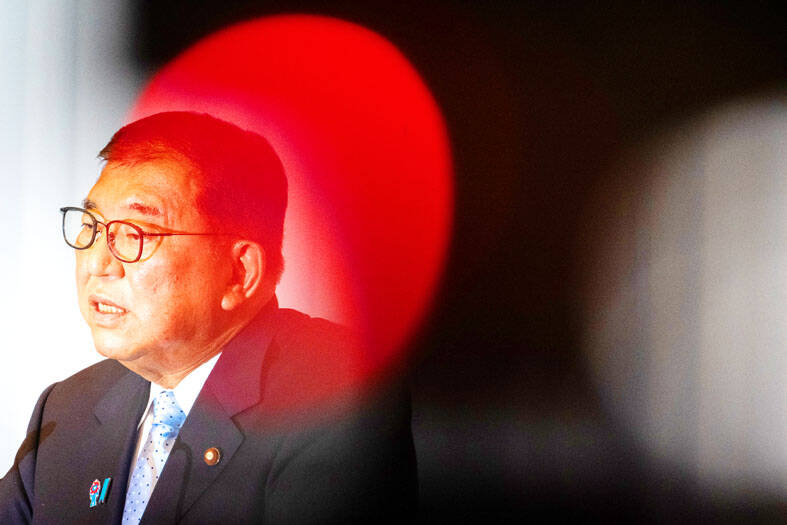
Photo: EPA
Given that Japan’s tariff negotiations with the US have not been set, its security position in the region would be affected, he said.
Taiwan Society of Japan Studies managing supervisor Yang Chun-chih (楊鈞池) said the election outcome showed that Japanese were dissatisfied with the administration of Japanese Prime Minister Shigeru Ishiba.
The LDP lost part of its support from conservative voters, while its policies to address inflation, increased rice prices and a low birthrate also affected the election, he said.
Prior to the election, US President Donald Trump claimed that Japan “won’t take” rice from the US and that it should raise defense spending in line with other NATO member states, statements that would strain US-Japan and Taiwan-Japan relations, as well as Ishiba’s administration, Yang said.
In related news, the Financial Times on Saturday quoted several anonymous sources from Japan and the US that said Tokyo officials had told Japanese companies in Taiwan they would be “on their own” if a conflict with China were to break out, leading to less foreign direct investment into Taiwan by Japanese firms.
Under Japan’s constitution, it could only deploy the Japan Self-Defense Forces abroad with the approval of a foreign government, which in a Taiwan scenario would be difficult given the countries’ lack of formal ties, Japanese officials said.
The report cited Japanese diplomats and business executives as saying the warnings have been going on for about three years, dating back to when then-US House of Representatives speaker Nancy Pelosi visited Taiwan.
That trip and subsequent tensions led to many firms reconsidering investments in Taiwan or forming contingency plans in the event of a crisis, it said.
The warnings have had a “chilling effect” on Japanese investment in Taiwan, the newspaper quoted an anonymous US official as saying.
One Japanese executive was quoted as saying that “risk assessment pretty much leads us to little interest in Taiwan” due to the lack of security guarantees and government support.
Several Japanese companies with large operations in Taiwan have conducted in-house exercises simulating what to do in the event of a conflict, including evacuations, it said.
Although Japanese government officials have observed some of the exercises, “the implicit understanding was that such efforts would be a private sector operation,” it said.
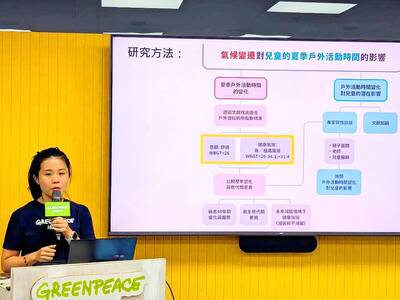
The government should improve children’s outdoor spaces and accelerate carbon reduction programs, as the risk of heat-related injury due to high summer temperatures rises each year, Greenpeace told a news conference yesterday. Greenpeace examined summer temperatures in Taipei, New Taipei City, Taoyuan, Hsinchu City, Taichung, Tainan and Kaohsiung to determine the effects of high temperatures and climate change on children’s outdoor activities, citing data garnered by China Medical University, which defines a wet-bulb globe temperature (WBGT) of 29°C or higher as posing the risk of heat-related injury. According to the Central Weather Administration, WBGT, commonly referred to as the heat index, estimates
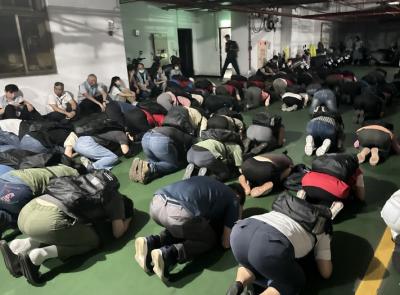
Taipei and other northern cities are to host air-raid drills from 1:30pm to 2pm tomorrow as part of urban resilience drills held alongside the Han Kuang exercises, Taiwan’s largest annual military exercises. Taipei, New Taipei City, Keelung, Taoyuan, Yilan County, Hsinchu City and Hsinchu County are to hold the annual Wanan air defense exercise tomorrow, following similar drills held in central and southern Taiwan yesterday and today respectively. The Taipei Mass Rapid Transit (MRT) and Maokong Gondola are to run as usual, although stations and passenger parking lots would have an “entry only, no exit” policy once air raid sirens sound, Taipei
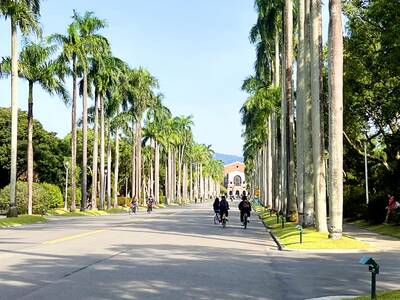
Taipei placed 14th in the Quacquarelli Symonds (QS) Best Student Cities 2026 list, its highest ever, according to results released yesterday. With an overall score of 89.1, the city climbed 12 places from the previous year, surpassing its previous best ranking of 17th in 2019. Taipei is “one of Asia’s leading higher-education hubs,” with strong employer activity scores and students “enjoying their experience of the city and often keen to stay after graduation,” a QS staff writer said. In addition to Taipei, Hsinchu (71st), Tainan (92nd), Taichung (113th) and Taoyuan (130th) also made QS’ list of the top 150 student cities. Hsinchu showed the
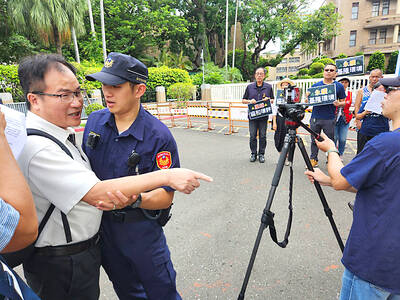
Environmental groups yesterday filed an appeal with the Executive Yuan, seeking to revoke the environmental impact assessment (EIA) conditionally approved in February for the Hsieh-ho Power Plant’s planned fourth liquefied natural gas (LNG) receiving station off the coast of Keelung. The appeal was filed jointly by the Protect Waimushan Seashore Action Group, the Wild at Heart Legal Defense Association and the Keelung City Taiwan Head Cultural Association, which together held a news conference outside the Executive Yuan in Taipei. Explaining the reasons for the appeal, Wang Hsing-chih (王醒之) of the Protect Waimushan Seashore Action Group said that the EIA failed to address